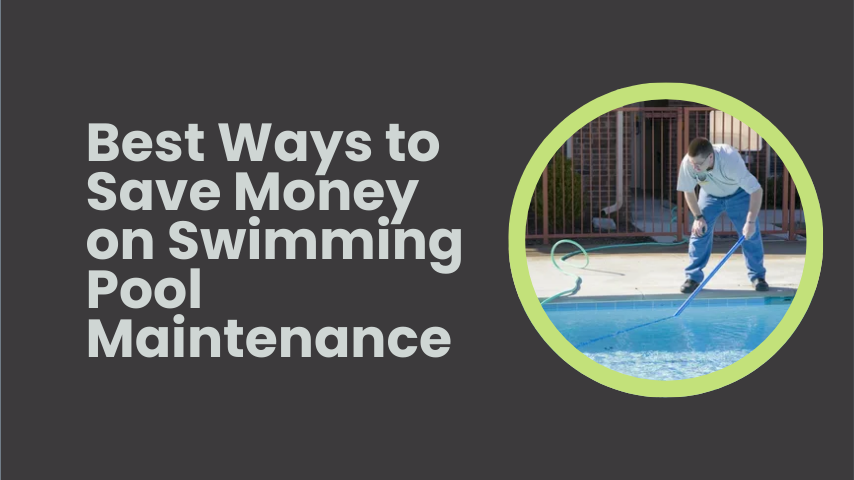Maintaining a swimming pool can sometimes be expensive, but it doesn’t have to be. With the right strategies, you can keep your pool in excellent condition without breaking the bank. In this article, we will explore the best ways to save money on swimming pool maintenance. We’ll cover a variety of tips and tricks, from routine cleaning to energy-efficient upgrades, to help you enjoy your pool while keeping costs down.
Why Swimming Pool Maintenance is Important
Keeps the Water Safe and Clean
Maintaining your swimming pool is crucial for keeping the water safe and clean. Without proper care, pools can become breeding grounds for bacteria and algae, making the water unsafe for swimming. Regular maintenance ensures that the water is properly balanced and sanitized, protecting the health of everyone who uses the pool.
Extends the Life of Your Pool
Regular maintenance not only keeps your pool clean but also extends its lifespan. Proper care helps prevent damage to the pool’s structure and equipment, reducing the need for costly repairs or replacements. By taking care of your pool, you can enjoy it for many years to come.
Saves Money in the Long Run
While it might seem counterintuitive, investing time and money in regular pool maintenance can actually save you money in the long run. By preventing major issues and catching small problems early, you can avoid expensive repairs and replacements. A well-maintained pool is also more energy-efficient, which can lower your utility bills.
Note:- If you’re looking for expert assistance with your swimming pool, consider Swimming Pool Maintenance Dubai for top-notch service and affordable rates. Our team of professionals is dedicated to keeping your pool clean, safe, and enjoyable all year round.
Routine Cleaning and Maintenance
Skim the Surface Daily
One of the simplest and most effective ways to keep your pool clean is to skim the surface daily. Removing leaves, bugs, and other debris from the water’s surface helps prevent them from sinking to the bottom and causing bigger problems. Use a long-handled net to make this task quick and easy.
Brush the Walls and Floor
Brushing the walls and floor of your pool helps prevent algae and dirt buildup. Use a pool brush designed for your pool’s surface type (e.g., concrete, vinyl, fiberglass) and scrub the walls and floor at least once a week. This will keep your pool looking clean and reduce the need for chemical treatments.
Balancing the Water Chemistry
Test the Water Frequently
Testing your pool water regularly is essential for maintaining the proper chemical balance. You can use test strips or a liquid test kit to check the levels of chlorine, pH, alkalinity, and calcium hardness. Test the water at least once a week and adjust the chemicals as needed to keep the water safe and clear.
Maintain Proper Chlorine Levels
Chlorine is the primary sanitizer for swimming pools, killing bacteria and algae. Maintaining the proper chlorine level (usually between 1-3 ppm) is crucial for keeping the water safe. Too little chlorine can lead to cloudy water and algae growth, while too much can cause skin and eye irritation.
Using Energy-Efficient Equipment
Upgrade to a Variable-Speed Pool Pump

A variable-speed pool pump can save you a significant amount of money on energy costs. Unlike single-speed pumps, which run at full speed all the time, variable-speed pumps can adjust their speed to match the pool’s needs. This reduces energy consumption and can lower your electricity bill by up to 90%.
Use a Pool Cover
A pool cover is an excellent investment that can save you money in several ways. It helps keep debris out of the pool, reducing the need for cleaning and chemical treatments. It also minimizes water evaporation, saving on water costs. Additionally, a pool cover can retain heat, reducing the need for heating the pool and lowering energy costs.
Smart Water Usage
Minimize Water Evaporation
Water evaporation is a significant cause of water loss in swimming pools. To minimize evaporation, use a pool cover when the pool is not in use. You can also lower the water temperature slightly and avoid running water features like fountains or waterfalls when they’re not needed. These small changes can help reduce water loss and save on water bills.
Fix Leaks Promptly
Even small leaks can lead to significant water loss over time. If you notice a drop in your pool’s water level, check for leaks and repair them promptly. Common areas for leaks include the pool liner, plumbing connections, and around the pool equipment. Fixing leaks early can prevent costly water waste and damage to your pool’s structure.
Efficient Chemical Usage
Use a Pool Cover to Reduce Chemical Use
As mentioned earlier, a pool cover can help reduce water evaporation. It also helps retain chemicals in the pool, meaning you’ll need to use fewer chemicals to maintain the proper balance. By keeping your pool covered when it’s not in use, you can save money on chlorine, algaecides, and other chemicals.
Buy Chemicals in Bulk
Purchasing pool chemicals in bulk can save you money in the long run. Large containers of chlorine, pH adjusters, and other chemicals are often more cost-effective than smaller packages. Just make sure to store them properly in a cool, dry place to maintain their effectiveness.
Conclusion
Maintaining a swimming pool doesn’t have to be expensive. By following these tips and implementing smart maintenance practices, you can save money while keeping your pool clean, safe, and enjoyable. Routine cleaning, balancing water chemistry, using energy-efficient equipment, and practicing efficient water and chemical usage are all key to reducing costs. Additionally, knowing when to hire a professional and learning basic maintenance skills can help you manage your pool more effectively. With these strategies, you can enjoy your pool without worrying about high maintenance costs.
Read more informative blog at technewsideas.


